Global warming is likely to make sourcing large supplies of fresh fruit and vegetables harder and more expensive, says leading supermarket chain Asda. It says
Category: Featured Articles (July – August 2014)
Kenya has now reached a decade of successful biological control of spider mites using predatory mites to replace acaricides. Correct use of the predatory mite,
Naivasha Horticultural Fair (NH Fair) has become the biggest and best “Trade Fair” of its kind in the region. The Horticulture Industry in Kenya and
Etihad Cargo announced more freight capacity in Tanzania, Switzerland and the U.S. Etihad Cargo began a weekly freighter service to Dar es Salaam, Tanzania. On
Kenya’s agricultural sector is one of the six key economic pillars of Kenya’s Vision 2030. This was said by the Principal Secretary, Ministry of Agriculture,
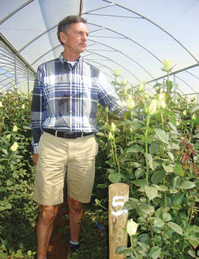 Mr. Simon Van Der Burg, Owner Timaflor Ltd
Mr. Simon Van Der Burg, Owner Timaflor Ltd
Background
Managing your leadership career is much like managing your stock portfolio. You must continuously decide on how to make your personal brand more valuable by knowing what skill-sets, capabilities and aptitudes to invest in and which not to throughout the course of your career. The ebbs and flows of your leadership career require you to make important choices about how to give your personal brand value. This must have been the case with Simon Van De Burg when he started a 5ha flower farm as a hobby in 2006. Eight years down the line, the forty years experienced Kenyan grower has seen his brand turn into a tangible and measureable influence into the sector with the farm growing to a serious 86ha investment.
Choice of Market
Future-oriented buyers of roses always search for new opportunities for both their own and their customers’ market positions. The purpose is two sided, a satisfied consumer and a sustainable positive result at the end.
What’s needed to succeed?
A clear insight in a completesustainable positive result at the end. What’s needed to succeed? A clear insight in a complete assortment of cut fresh and high quality roses, the ability to shift as quickly as possible through direct contact with the market, perfectly organized logistics, daily quality control and further preparation as you and your customers prefer. Aalsmeer auction offers this all.
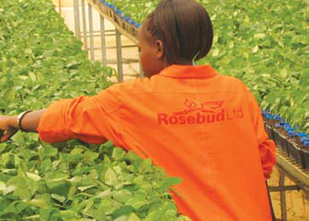 Two of the 18 Ugandan flower growers and exporters participated in the third International Floriculture Trade Expo (IFTEX) which was held at Oshwal Center, in Parklands, Nairobi. The farms are Rose Bud Limited and Mairye Estate.
Two of the 18 Ugandan flower growers and exporters participated in the third International Floriculture Trade Expo (IFTEX) which was held at Oshwal Center, in Parklands, Nairobi. The farms are Rose Bud Limited and Mairye Estate.
Rosebud Limited, located off Entebbe Road, the largest exporter of Sweetheart cut roses from East Africa and largest exporter of roses from Uganda. The farm produces approximately 40% of total Ugandan flower exports. Mairye, which is located in Ntinda Village, Busukuma Subcounty, Wakiso District, produces about half that amount. Sivalingam Ravi Kumar, the Farm Manager, Rose Bud Limited says IFTEX’s growing popularity shows that there is a fundamental shift in the floriculture market towards Africa with Kenya as the hub, something he says Ugandan flower farmers can take advantage of.
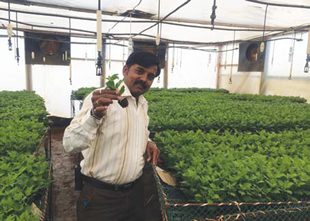 Who is Nirzar Jundre?
Who is Nirzar Jundre?
(Backgroundpersonal and as a grower) I am a Kenyan of Indian Origin. Professionally I studied B.Sc. Agriculture and Masters in Personnel management, it was my Father who sent me to study horticulture after my 10th std., and otherwise I wanted to study Mechanical engineering, immediately I developed interest in horticulture. I was good in my studies, as well as sports and managed to be general champion in Athletics during my University days.
I started my career in 1993 after graduating where I worked in companies dealing with Tissue Culture technique for plant propagation. After three and a half years, I got a chance to work with a flower farm growing Roses, Gerbera & Carnation. Three and a half years later, I got a chance to come to Kenya that is, year 2000 with recommendation from my good friend and Guru in floriculture Mr. Avinash Mokate. I joined Liki River Farm as a Flower Manager, where I initiated the first commercial Rose cultivation for Vegpro group. In the beginning it was a challenge for me to train people who had been working with vegetable production to flower growing but with team work, we succeeded. It was really a good experience.
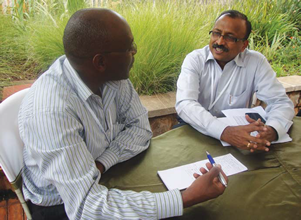 Kenya’s floriculture sub-sector is courting the United States, Russian, Korean and Japanese markets as it seeks to expand from traditional European Union (EU) market.
Kenya’s floriculture sub-sector is courting the United States, Russian, Korean and Japanese markets as it seeks to expand from traditional European Union (EU) market.
Delegates of leading international buyers, wholesalers and retailers from more than half a dozen countries outside the EU market attended the third edition of the International Flower Trade exhibition (IFTEX).
Middle East Market
The phenomenal growth of Black Tulip Group in flora trade is set to benefit Kenya more than any other country. Currently the group has boasts of Black Petals, Blue Sky ltd, Laurel Investments, Utee Estate, Golden Tulip farms Ltd and Tropiflora Ltd.
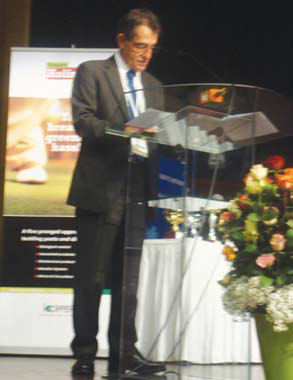 Flower prices over the last six years have grown at only 7 percent whereas costs of production in Kenya have risen by more than 50 percent. This has impacted on the profits and ability to reinvest and expand. Principal amongst these cost increases are power and labour. In addition, the industry has also sought to absorb cost increases through improved efficiencies. This was said by Mr. Richard Fox, Kenya Flower Council Chairman, during the opening of IFTEX 2014.
Flower prices over the last six years have grown at only 7 percent whereas costs of production in Kenya have risen by more than 50 percent. This has impacted on the profits and ability to reinvest and expand. Principal amongst these cost increases are power and labour. In addition, the industry has also sought to absorb cost increases through improved efficiencies. This was said by Mr. Richard Fox, Kenya Flower Council Chairman, during the opening of IFTEX 2014.
Growth
Admireably, the industry has been growing from 1995 when flower exports amounted to 25,000 tonnes.
Speaking during the annual industry event, he added that the industry grew annually at a remarkable 10 percent up to 2008 when it reached 120,000 tonnes and became one of the top forex earners for the economy, contributing 3 percent to GDP and 9 percent of Kenya’s exports. Equally importantly the industry has created more than 50,000 jobs in direct employment and many more in support industries and services.
